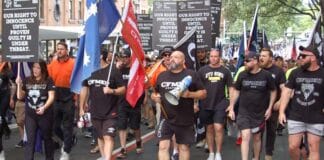Barry O’Farrell has let rip the Liberals’ real agenda for NSW. He is slashing workers’ compensation payments, cutting public service jobs, attacking teachers and preparing for further privatisations.
Last year O’Farrell targeted public sector workers, forcing the IRC to impose a 2.5 per cent wage cap on pay rises. Despite two large public sector-wide rallies and talk of fighting the wage cap, most unions have simply accepted 2.5 per cent pay rises.
O’Farrell has taken this as a sign that he will not face serious resistance. So he has launched a whole series of new attacks.

In an effort to avoid higher premiums for the bosses, he will cut workers’ compensation benefits, affecting every worker in NSW. Weekly payments to compensate for lost wages will be reduced, and cut out altogether after two and a half years for all but the most seriously injured workers—even if they cannot go back to work. Medical expenses will also be cut back, leaving those with ongoing medical bills out of pocket.
A total of 15,000 job cuts in the public service have been announced, and bus drivers told to sacrifice penalty rates and accept casualised working conditions or face privatisation.
Time to fight
So where is the fightback? Unions NSW organised a rally of around 1000 workers outside NSW Parliament against the workers’ compensation changes.
But this is a far cry from the 35,000 public sector workers who marched last September, let alone the kind of strike action that could derail the Liberals’ plans.
The firefighters union showed the kind of pressure that strike action could produce, staging their first strike in 56 years over the workers’ compensation changes. They secured an amendment in the upper house giving firefighters and paramedics the same exemption from the changes granted to police. But this left all other workers stuck with the changes, and did little to pressure other union leaders to fight.
The MUA and the firefighters union have pushed for a general strike around workers’ compensation. Most of the other union leaders see the next election as the only way of stopping the Liberals.
But O’Farrell’s cautious approach shows why this is wrong. He has announced new attacks bit by bit, testing the level of opposition to decide if he will proceed.
He has already suffered a minor setback with the amendments to workers’ compensation. But if the unions fail to fight, he will simply gain confidence to launch more cutbacks and attacks.
We need to rebuild networks of rank-and-file activists inside the unions that can pressure the union leaders to act. The unions that are prepared to act, like teachers, firefighters and the MUA, need to strike together to help pressure the rest of the movement to follow them.





